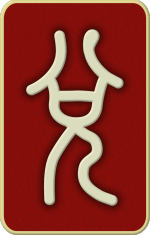
兑 Duì Joyfulness (Satisfaction) [hexagram 58]

 Metal element
Metal element
Autumn Equinox ; Host (controlling) line : 5
The Decision
Serenity and fulfillment. Persistence is rewarded.
Joyful satisfaction. The strong is at the middle and weak at the extremities. Pleasure is the reward of persistence, complying with the will of heaven and the wishes of the people. When pleasure is sought by the people they forget their weariness; it stimulates them when encountering danger to overlook their mortality. The power of Joyfulness stimulates the people to action.
兑: 亨, 利贞. Duì: hēng, lì zhēn.
彖传: 兑, 说也. 刚中而柔外, 说以利贞, 是以顺乎天, 而应乎人. 说以先民, 民忘其劳; 说以犯难, 民忘其死; 说之大, 民劝矣哉! Tuàn zhuàn: Duì, shuō yě. gāng zhōng ér róu wài, shuō yǐ lì zhēn, shì yǐ shùn hū tiān, ér yīng hū rén. shuō yǐ xiān mín, mín wàng qí láo; shuō yǐ fàn nán, mín wàng qí sǐ; shuō zhī dà, mín quàn yǐ zāi!
The Image
Waters one on top of another form ‘Joyful satisfaction’. The wise accordingly encourage conversation between friends to cultivate the best practice.
象传: 丽泽, 兑; 君子以朋友讲习. Xiàng zhuàn: Lì zé, duì; jūn zǐ yǐ péng you jiǎng xí.
Line Change 1
Contented harmony. Good fortune.
The good fortune from ‘contented harmony’ comes from the lack of doubt.
初九: 和兑, 吉. Chū jiǔ: hé duì, jí.
象传: 和兑之吉, 行未疑也. Xiàng zhuàn: Hé duì zhī jí, xíng wèi yí yě.
Line Change 2
Sincere joyfulness. Good fortune. Regrets vanish.
The good fortune from ‘Sincere joyfulness’ comes from self-belief.
九二: 孚兑, 吉, 悔亡. Jiǔ èr: fú duì, jí, huǐ wáng.
象传: 孚兑之吉, 信志也. Xiàng zhuàn: Fú duì zhī jí, xìn zhì yě.
Line Change 3
Self-satisfaction. Misfortune.
‘Self-satisfaction’ – the place is inappropriate.
六三: 来兑, 凶. Liù sān: lái duì, xiōng.
象传: 来兑之凶, 位不当也. Xiàng zhuàn: Lái duì zhī xiōng, wèi bù dàng yě.
Line Change 4
Considering what gives pleasure but anxious. If avoid worrying too much then there will be happiness.
The reward from the fourth ‘nine’ comes from the happiness produced.
九四: 商兑, 未宁, 介疾有喜. Jiǔ sì: shāng duì, wèi níng, jiè jí yǒu xǐ.
象传: 九四之喜, 有庆也. Xiàng zhuàn: Jiǔ sì zhī xǐ, yǒu qìng yě.
Line Change 5
Misplaced trust. Misfortune.
‘Misplaced trust’ – even though the place is correct and appropriate.
九五: 孚于剥, 有厉. Jiǔ wǔ: fú yú bō, yǒu lì.
象传: 孚于剥, 位正当也. Xiàng zhuàn: Fú yú bō, wèi zhèng dàng yě.
Line Change 6
Seductive pleasures.
‘Seductive pleasures’ – the yielding top line shows uncultivated virtue.
上六: 引兑. Shàng liù: yǐn duì.
象传: 上六引兑, 未光也. Xiàng zhuàn: Shàng liù yǐn duì, wèi guāng yě.
The full set of 64 English translations is available in our new book 'Book of Changes - Deciphered' ➚.